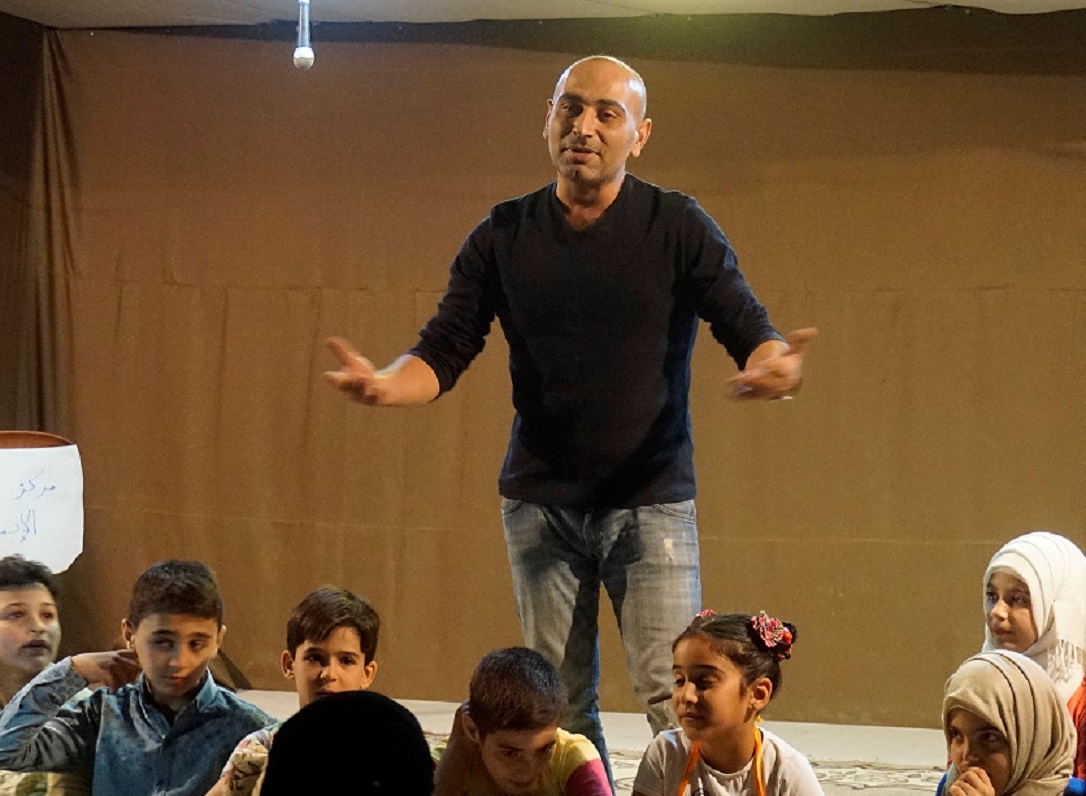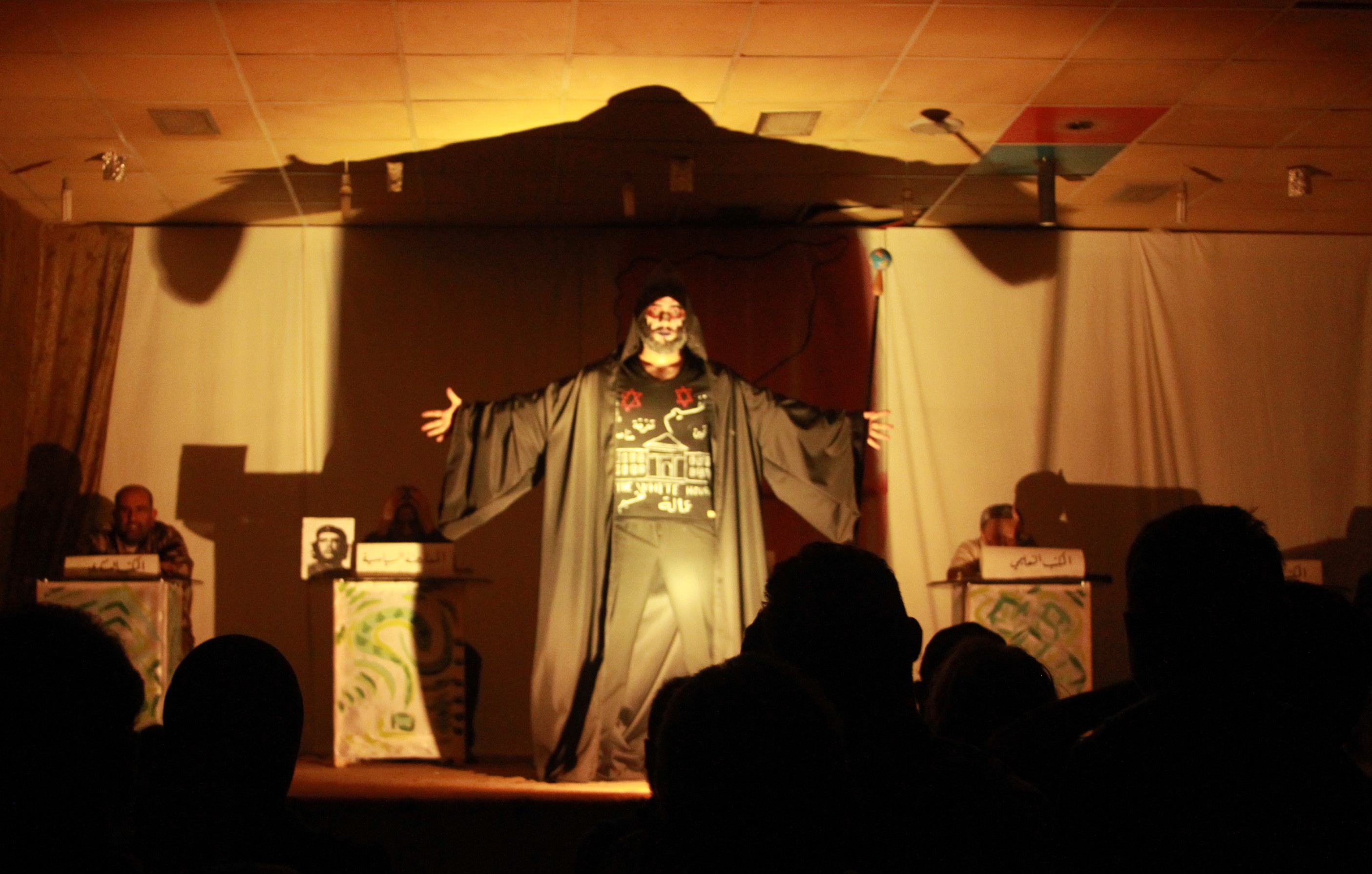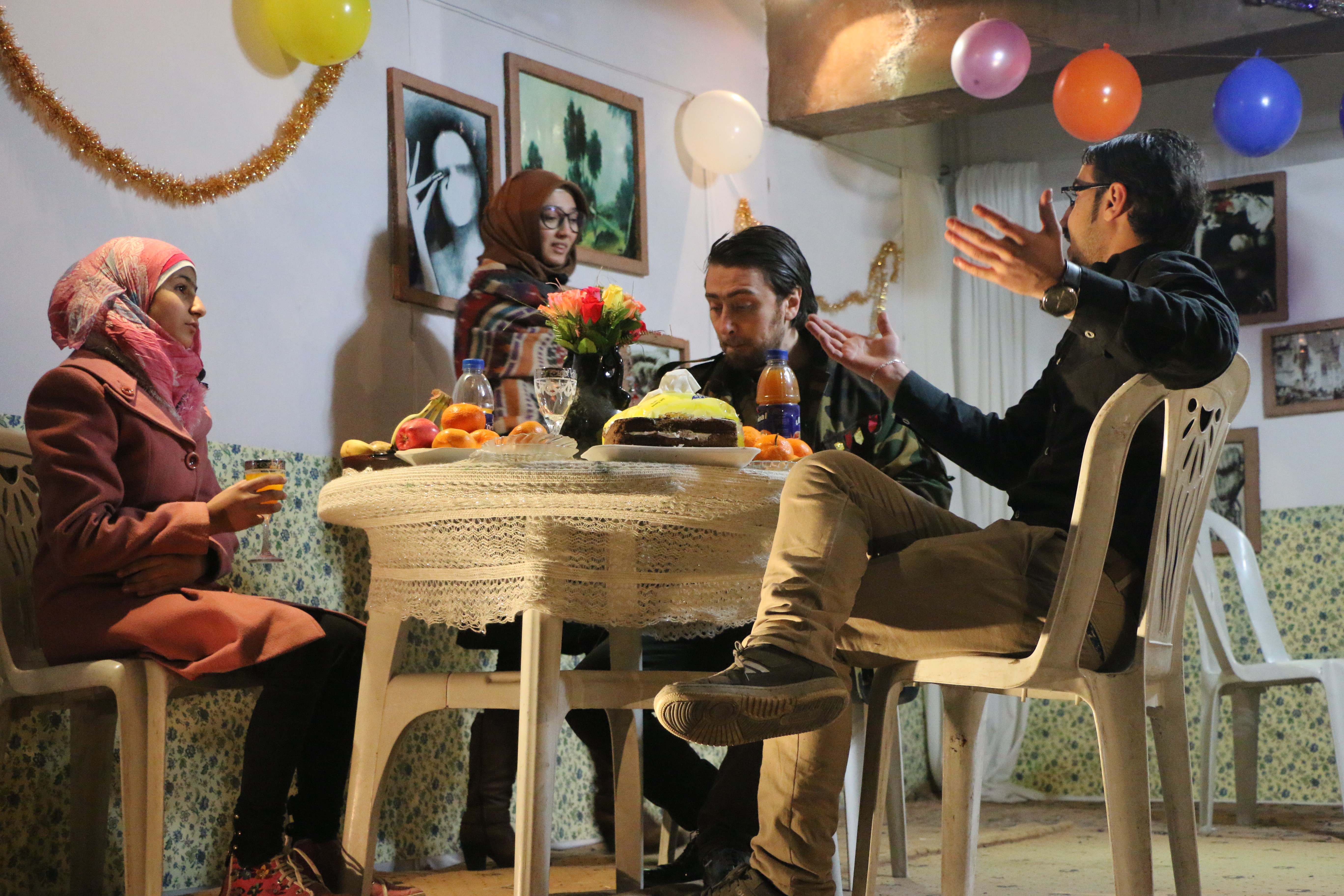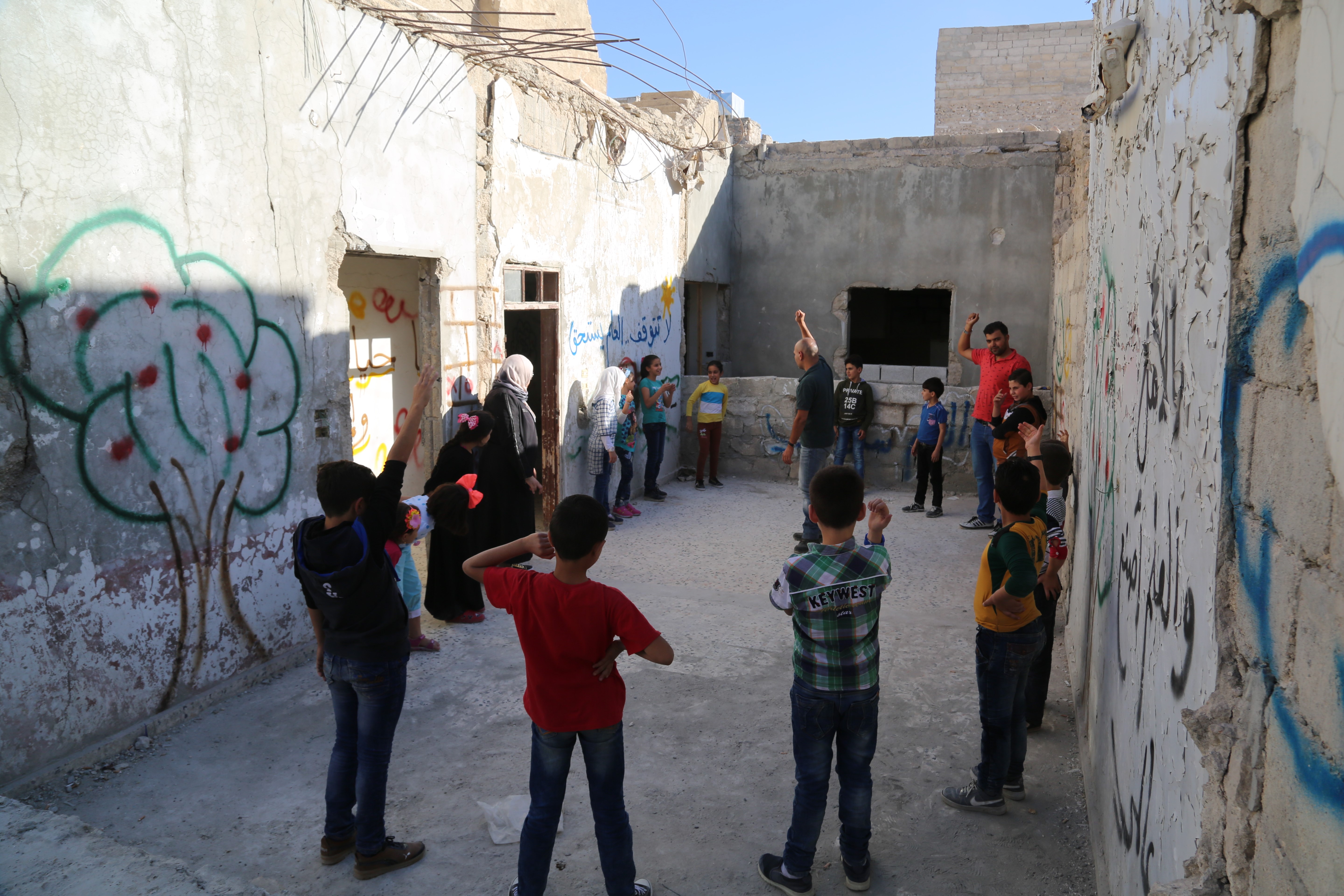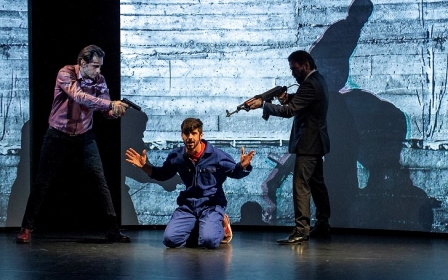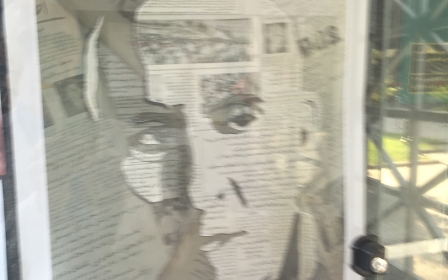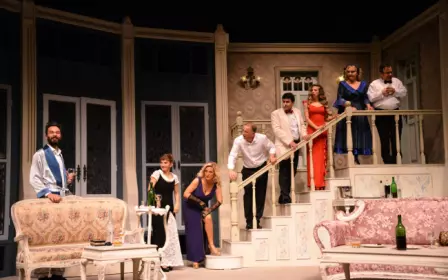Syria’s fugitive theatre-maker still making drama about peace and freedom
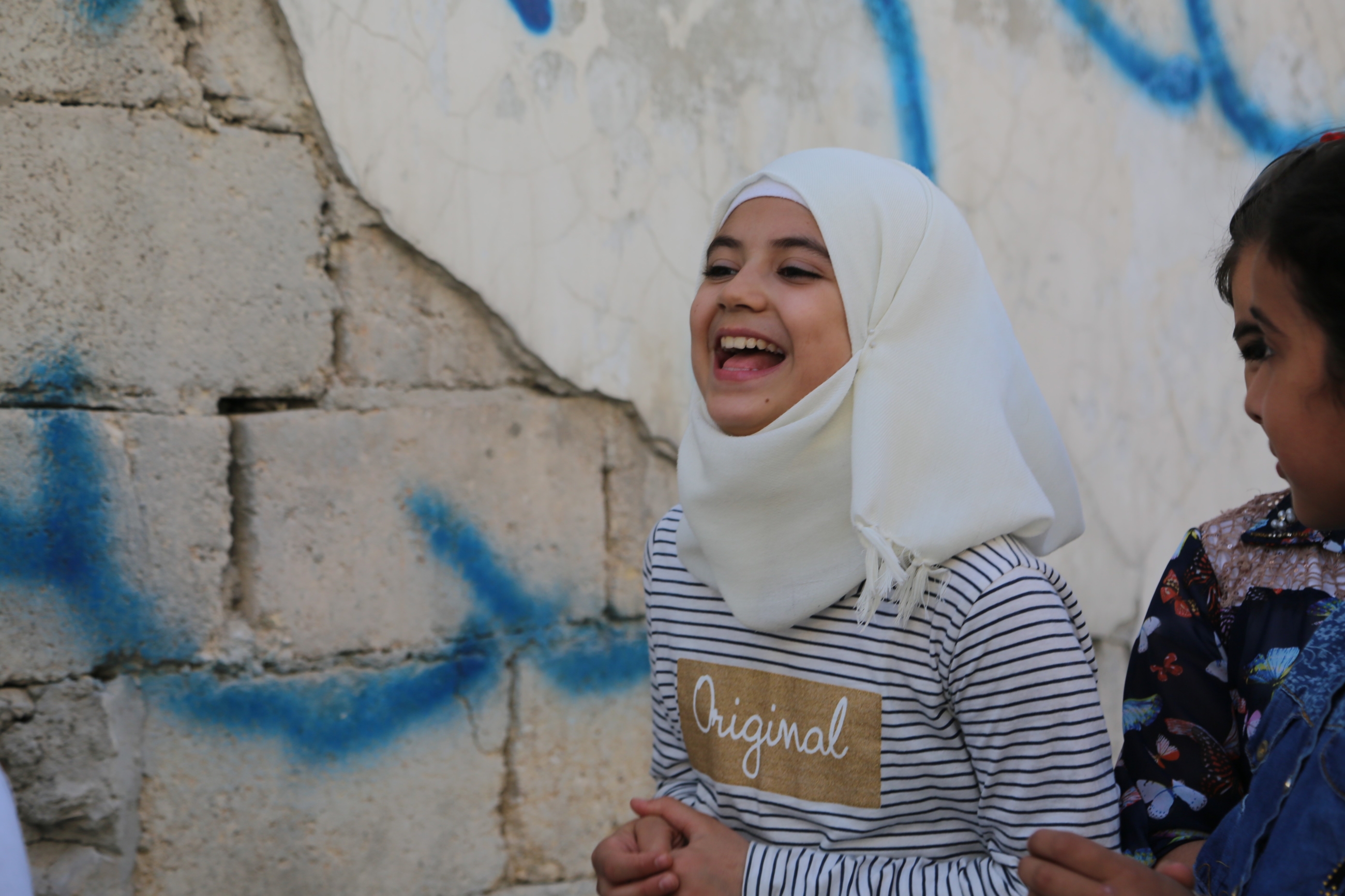
Children are waiting in line for food that is being distributed by a rebel group, only to be told there is not enough and that they should come back the following month. One of the children then leads a demonstration and the rebel fighters flee.
The children are, in fact, actors performing a scene from a 2017 play by Salman Ibrahim, a Syrian theatre-maker who has worked in rebel-held territory for most of the war.
'I wanted to indicate that if people unite, they get their rights'
- Salman Ibrahim
Called Only Dignity, the play was the last full-length drama he made before fleeing the country last February. Like much of his work, it focused on the conflict, but Ibrahim says the oppressors were no longer only the government of Bashar al-Assad. They were also rebel groups.
“I wanted to indicate that if people unite, they get their rights,” he told Middle East Eye.
Ibrahim based the scene on protests against rebel groups in the Bustan al-Qasr neighbourhood of Aleppo shortly before the evacuation of rebel-held areas in the city’s east in December 2016.
Stay informed with MEE's newsletters
Sign up to get the latest alerts, insights and analysis, starting with Turkey Unpacked
Danger follows
Salman Ibrahim’s career in theatre has followed the arc of the Syrian story before and after the revolution and subsequent civil war. He graduated from the theatre department at Homs University in 2005 and started making plays with his friends underground.
With the outbreak of protests in 2011, danger followed Ibrahim as he followed the Syrian opposition. He lived in rebel-controlled eastern Aleppo until December 2016 when the rebels evacuated the city following the government victory.
In November 2017, he moved to al-Bab, where pressure from Turkish-backed groups forced him to leave behind his youth theatre project. Ibrahim subsequently went to southern Turkey in February 2018 but couldn’t stand being away from the young, future theatre stars.
Ibrahim smuggled himself back into the last rebel enclave of Idlib in October, where he worked on peacebuilding activities for children. This month, he fled again, this time to the Turkish zone in northern Syria, after receiving threats from al-Qaeda-linked Hay’at Tahrir al-Sham militants.
Ibrahim says that plays addressing the political situation are now difficult in rebel areas, mirroring the restrictions the Syrian government imposes on independent theatre.
“People have returned to the ideas of the regime,” he told Middle East Eye. “The difference is the face of those who govern.”
Political messages on stage
Ibrahim’s career as a fugitive theatre-maker is ongoing. Although unable to make political theatre anymore in HTS-dominated Idlib, he’s found an outlet with peacebuilding activities that prepare children of opposition supporters for a post-war Syria dominated by the government.
Ibrahim first put on plays after finishing his studies at Homs University in 2005. Even in those pre-revolution days, he and his friends were putting political messages on the stage, but they couldn’t perform for anyone at the time due to the anti-government content contained therein.
Ibrahim cites the late German playmaker Bertolt Brecht as his primary influence.
It wasn’t until Ibrahim moved to the former rebel enclave of east Aleppo, where revolution-inspired art existed, that he began to make plays that he felt were worthy for the community that lived there, he explained.
“Almost two years into the revolution, Aleppo was the only [place] among the liberated cities in Syria that established a unique theatre experience,” Ibrahim said. “In terms of the revolution, it was the main scene for theatre activities.”
A fragmented country
The evacuation of east Aleppo was the first in a string of many victories for the government, aided by Russia from late 2015. The government now controls most of the country, with Idlib, parts of the north controlled by Turkey, and the large Kurdish Syrian Democratic Forces (SDF) territory in the northeast as exceptions. As time went on, the original, democratic spirit of the revolution became lost, according to Ibrahim.
“Each party tried to use the Syrian people’s cause for its own benefit,” he said. “And this is the result: fragmentation and the loss of all the gains that we achieved at the start of the revolution.”
The plays he makes have changed as the composition of the rebels became more and more dominated by the al-Qaeda-linked HTS, and Turkey and its allies took more control of rebel territory.
In Aleppo, he used adult actors and included characters representing both rebel and government forces. In al-Bab, controlled by Turkey’s rebel allies and safer than Aleppo was, he used child actors who were displaced and sought refuge in the city.
He was also able to advertise the play on social media in al-Bab, whereas in Aleppo, he refrained from doing this due to the threat of being targeted by government bombs.
The opposition may have changed, but it is still necessary to do political theatre on the stage, according to Ibrahim.
Preparing for post-war Syria
“I was forced to continue theatre work because of the mistakes most of those who took power during the revolution made,” he said. “We no longer tolerate the oppression.”
Ibrahim works independently and does not seek permission from any armed groups to put on plays. A lack of supplies, adequate funding, and security have thus always been struggles for him – from Homs to Idlib.
'We no longer tolerate the oppression'
- Salman Ibrahim
In Idlib, Ibrahim was working with children as he did in al-Bab. However, his work shifted to peacebuilding activities with artistic elements, which is safer, due to its less overtly political nature.
Clare Payne, an NGO worker based in Romania who is working independently with Ibrahim on the programme, says the children’s activities prepare them to live in a post-war Syria with supporters of different rebel groups and the government – without re-traumatising them in the process.
Peacebuilding is not about accepting the other side’s wrongs, which people in Syria are reluctant to do. Instead, it is about learning how to live with them without fighting, according to Payne, who works for the Peace Action Training and Research Institute of Romania.
“People think peace-building is peace with the enemy, and makes you a traitor,” she told Middle East Eye. “This is not how peace-building works.”
One programme they do teaches the children the pitfalls of seeking revenge. For example, in a balloon activity, the kids are told to protect the balloons, while others are given toothpicks. The kids with the toothpicks usually pop the balloons, and then the students switch roles. This teaches them that nobody benefits from retribution since few balloons are left by the end.
“They see that everyone lost,” she said.
Other activities show the children how varying points of view can be simultaneously correct. In another activity, they look at multi-side boxes with pictures on them, and say what they see.
“Children in Latakia, Deir Ezzor, all see different realities,” said Payne. “They’re all correct with what they see, but that doesn’t mean others aren’t also correct.”
Payne met Ibrahim during a workshop in Turkey and wanted to work with him on the Idlib project because of his sincere desire to build peace in Syria.
It’s rare to find somebody who came from so much hurt and suffering, but is still open to the term ‘peacebuilding'
- Clare Payne
“It’s rare to find somebody who came from so much hurt and suffering, but is still open to the term ‘peacebuilding’,” she said.
A future without violence
Payne thinks that it could be a long time before Syrians from different sides of the conflict can have good relations. However, she believes Northern Ireland - which she is from - provides an example of a possible negative peace, where people may disagree but can live without fighting.
Northern Ireland, which is part of the UK, has peace walls separating mainly Protestant pro-British neighbourhoods from mainly Catholic, pro-Irish republican ones. This has resulted in less violence between the areas.
“People still feel uneasy, but it’s better than before,” she said.
The children in rebel parts of Syria will likely soon be faced with changing power dynamics as the government continues to make gains. Payne and Ibrahim are working to help them not give up on their ideals but live with this reality.
“It means protecting children,” said Payne. “And giving them the skills to be able to live without violence.”
Ibrahim doesn’t know if or when he will able to return to Idlib. Despite having had to flee from city to city in search of safety, his work with Syrian youth inspires him to continue.
“There is always a glimmer of hope,” he said. “The children are the seed of the future.”
Middle East Eye delivers independent and unrivalled coverage and analysis of the Middle East, North Africa and beyond. To learn more about republishing this content and the associated fees, please fill out this form. More about MEE can be found here.


